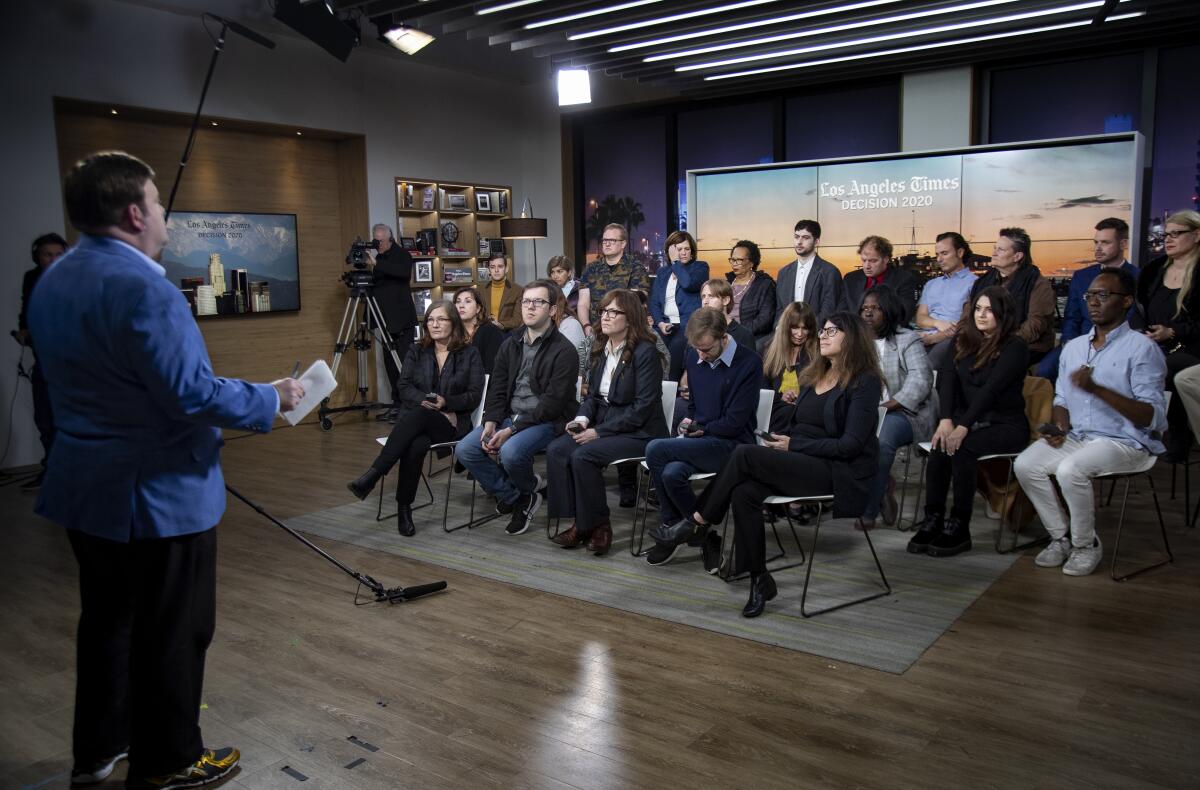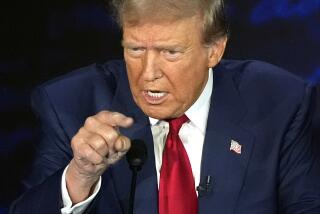The message from a recent Times focus group? Bernie Sanders is still in the game

- Share via
I am not a California Democrat, and I don’t play one on television. But having spent almost five hours in a town hall setting with 25 likely Democratic primary voters Thursday evening as they watched the latest presidential debate, I can say with some conviction that Bernie Sanders is still a leading contender.
I’ve been conducting these voter forums since 1996, when my NBC News panel had Bill Clinton crushing Bob Dole in their second presidential debate. Since then, I’ve done sessions for CBS, ABC, Fox News, MSNBC, CNBC, the BBC, and a host of national and international news outlets. Their record of selecting debate winners — and predicting election outcomes — isn’t bad. These panels narrowly chose George W. Bush versus Al Gore in 2000, selected Bush over John Kerry in 2004, unanimously chose Barack Obama over John McCain in 2008, and gave Obama the win over Mitt Romney in two of the three debates in 2012.
Perhaps the most controversial conclusion occurred after the second presidential debate in 2016 when our CBS panel gave Donald Trump the nod at a time when Hillary Clinton was viewed as a sure thing. These panels proved more predictive than the network exit polls I had access to that year.
As for Thursday’s session conducted for this newspaper, the participants were typical of a California Democratic primary voter. (You can view our Times town hall here.) To assemble a group we thought would be representative, my firm drew both from its internal database of individuals interested in participating in focus groups and from a list of people who submitted questionnaires after being invited to do so on social media.
A majority were progressive, female and with some college education. All of them live in Southern California, though a fair number were born elsewhere. And if they had a candidate preference when the debate started, it was essentially a tie between Joe Biden, Sanders and Elizabeth Warren — identical to recent California statewide polling.
To be clear, there is no Democratic front-runner in California, and there probably won’t be until someone wins Iowa and New Hampshire. The published statewide polling has Biden, Sanders and Warren in a statistical tie — but most voters haven’t yet made up their minds.
In our town hall, too, there was little certainty, except for the nearly universal determination of the participants that they would vote for anyone who could beat Trump. Only six of the participants went into the debate firmly committed to a candidate. The other 19 wavered as the night wore on, shifting effortlessly between the candidates like palm trees swaying in the breeze.
The benefactor of all that shifting was Sanders. Republicans (and many independents) consider Sanders and his policies extreme, but the majority of our Democratic participants saw him as mainstream, embrace most or all of his agenda, and most importantly, love his passion. The reason this matters? It helps explain why Sanders has risen in the California polls in recent weeks: His appeal for a progressive agenda is full-throated and unapologetic. Unlike Biden, he doesn’t appear to waver. Unlike Warren, he doesn’t get tripped up by those pesky policy details. And unlike Pete Buttigieg, he is always on the attack.
For the participants in our focus group, those things mattered. They liked that Sanders stated what he stood for without hesitation or reservation, and they believed he could take the fight right to Trump’s front door. Candidly, I thought Sanders was too extreme and that Democrats would fear the rejection by moderates and independents to his left-wing lecturing and caffeine-laced delivery.
But while some of the focus group participants did express strong concern about his electability, others thought his positions and zeal were exactly why he’d be electable. He visibly eschews the Clinton steady-as-she-goes moderate approach in favor of a damn-the-torpedoes full-steam-ahead strategy that excites the Democratic base. For our Democrats, Sanders won the debate — even among some who said they wouldn’t vote for him in the primary — precisely because the intensity of his energy matched the intensity of his ideology.
What the participants didn’t want was best represented by the heated exchange between Buttigieg and Warren over campaign finance and the role wealthy Democrats play in the political process. As the initiator and aggressor, Warren came out on top. After facing withering criticism, it’s highly unlikely Buttigieg will ever do another wine tasting event with $900 bottles of wine. But Warren was definitely hurt when Buttigieg attacked her for setting fundraising standards that she herself hadn’t met. Expect to see that confrontation again and again in campaign ads from the other candidates.
As for Biden, it was not a good night. While he opened strongly with one of the three best-tested lines of the evening (“The middle class is getting killed. The middle class is getting crushed. And the working class has no way up.”), our participants soured on him as the debate wore on. It was less about what he said and more about how he appeared. Some pundits gushed that it was Biden’s best debate yet, but that’s hardly a high standard. In Iowa and New Hampshire, where the most candidates have spent the most time campaigning, Biden has slipped significantly over time, and has fallen out of first place in both states.
In our focus group, seven people came to the session as Biden supporters, but only three felt he won the debate. Conversely, six people arrived at the L.A. Times studios supporting Sanders, but 14 left the premises believing Sanders did the best of all the candidates.
Our participants responded particularly well when a candidate talked about how tough it is for the middle class to get ahead. To be clear, the economic numbers factually suggest this is the strongest economy in decades. But telling voters that it is still difficult — too difficult — for working families to pay the bills and save for the future is a powerful message that will be well received by Democrats, independents and moderates. Expect to hear this “cost of life” message a lot in the months ahead.
Democrats don’t care much for billionaires, and the town hall participants allowed that disdain to bubble over when discussing the Warren-Buttigieg spat. “Unsavory” was the descriptor of choice for someone with a lot of money who tries to influence the political process. That sentiment came out loud and clear when they discussed Michael Bloomberg, New York’s mayor for 12 years. He has already spent tens of millions of dollars in paid advertising, and is still only at 5% nationally and at just 3% in California.
The other place the participants made their contempt clear was when I asked them to describe Trump voters. “Ignorant” was invoked a half-dozen times, harking back to when Clinton publicly described Trump supporters as “deplorables.” It wasn’t appropriate then … or now.
I have no doubt that Trump voters would have equally harsh criticisms of the left. Trump himself has been particularly disparaging of California Democrats. But surely all of us, Republicans and Democrats alike, can criticize those we fundamentally disagree with without resorting to insults. It’s a lesson everyone in politics needs to learn. Yes, it is still possible to win a debate, and perhaps even an election, by telling voters what you are for, not what other candidates are against.
Let’s hope the candidates are listening.
Frank Luntz has conducted televised focus groups for major news outlets since 1996. He is not working for any presidential candidate or political party in the 2020 election. His political work was primarily for Republicans in the past.
More to Read
A cure for the common opinion
Get thought-provoking perspectives with our weekly newsletter.
You may occasionally receive promotional content from the Los Angeles Times.









